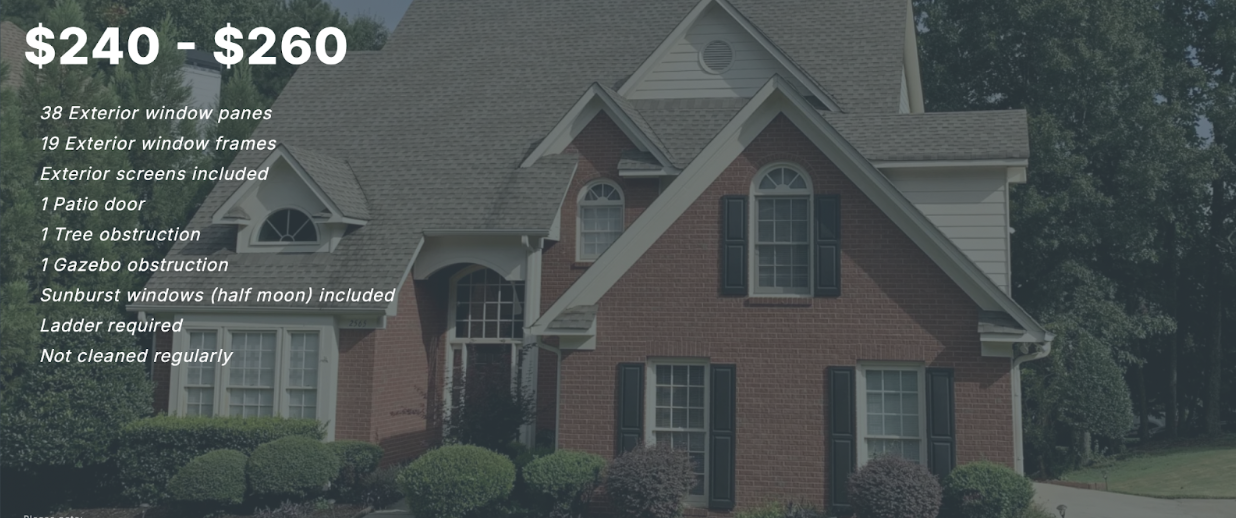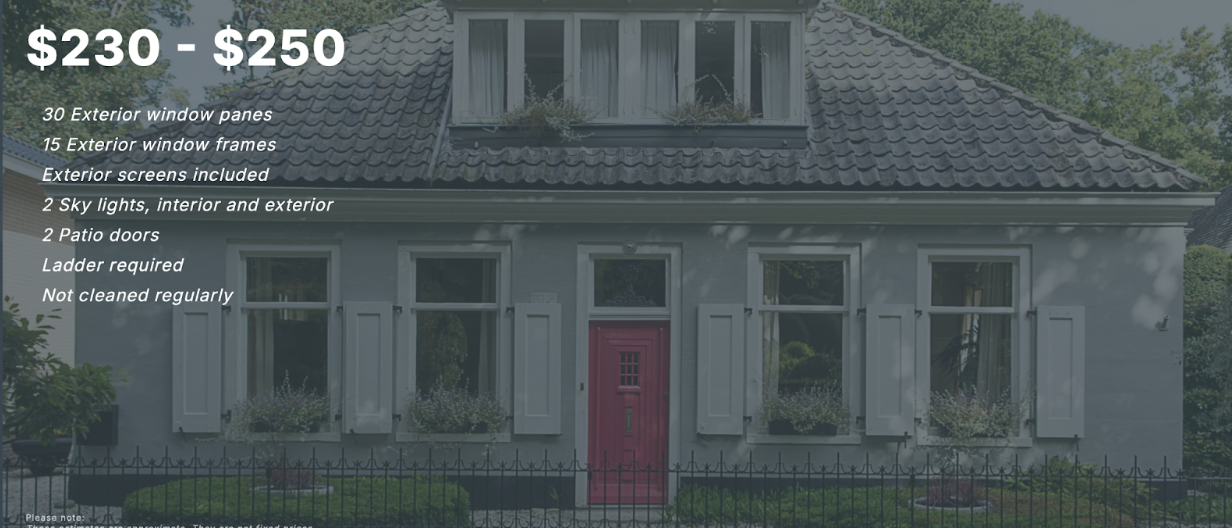Behind the Squeegee: Market Insights & Tech-Driven Growth in Window Washing
- Ameliorated Team

- Jul 29
- 9 min read
Updated: Jul 30
TLDR: Window washing is a low-capital, highly seasonal, and competitive service industry with growing acquisition interest. Margins are tight due to low job pricing and high OpEx, but tech-enabled operators are finding efficiency through tools like Jobber, Housecall Pro, and AI-based automation. While the market remains fragmented, consolidation is underway. This is driven by regional operators and selective private equity. The most attractive acquisition targets are those with recurring revenue, bundled services, standardized operations, and strong online reputations. In 2025, the winners in this space are those who systemize, automate, and scale.
Micro Market Insights
Overview:
Window washing is a low-barrier-to-entry business; it requires far less capital and equipment than similar services (e.g., junk removal). This makes it a classic example of a perfectly competitive business. It may require less initial capital expenditure, but as a result of high demand during peak seasons, capital allocation is very seasonal. Window washing businesses also typically have a lower average revenue than counterparts. As such they require higher job frequencies with clients. Finally, they face a seasonality dip during the winter, especially in Southwestern Ontario.
Pricing Strategy
Window washing businesses use a multitude of strategies to maximise revenues. For example, one large franchised chain across Canada extracts specific details from clients, using factors ranging from the home size to basement configuration in order to estimate a price. In this model, price is dependent on the layout of the home as some areas need different services based on a multitude of components. Prices can range from under $100 to over $400 depending on the client’s desires.
Other companies use more straightforward methods, including charging by pane and other items such as doors, patios, and type of equipment used. Oftentimes, like the first model, the quote comes down to the requirements of the job; however, this method is more clear-cut.
Additionally, companies may also do gutters (most common) or other home services (e.g. junk removal, pressure washing, etc). These businesses often offer a bundle with window washing and another service together for a discount. 10% is a standard rate. This allows the company to increase revenue while reducing travel time and expenses, and captures market share from other companies who do not have the resources to offer multiple services.
Here are some pricing examples:

Operations:
Contrary to other businesses, window washing companies often send crew sizes of just one person if equipment capacity allows. When employees use personal vehicles, the business can access more clients per day. Since the labour is generally safe and does not require heavy lifting or other two-person jobs, there are more advantages to one-person crews.
Here is some common equipment used:
Water Fed Pole
Window scrubber
Ladders
Pressure washer
Truck, van, etc
Solution (company dependent)
Buckets
Multipurpose tools
Water filter tank system
Leads and Marketing:
Since window washing is a highly competitive business, businesses use an array of strategies to gain an advantage. Like other industries, social media marketing on Facebook and Instagram is highly prevalent. Door to door sales are also common; companies will use flyers and talk directly to homeowners to gain new clients. Businesses with enough cash may also advertise with local sports teams, such as youth sports or minor league teams. A website is useful to direct potential clients to a centralized booking system, though some companies only provide a phone number. This may be done to collect additional information about the job and to provide an accurate quote and to predict how long a job will take. As always, stronger Google SEO’s and more positive reviews correlate to stronger business.
Basic Financial Statement Projection Findings:
As outlined in the overview, revenue projections are lower, even if staffing is higher, than companies with more pricier jobs and more capital. This low revenue, high staff combination also means lower margins due to higher OpEx as a percentage of revenue. Otherwise, other expenses are kept fairly low and cost of capital is low as a small business with some cash on hand.
The window and pressure washing industry is beginning to show early signs of consolidation. While the market remains highly fragmented and largely composed of small, owner-operated businesses, there is a noticeable increase in acquisition activity. These transactions are driven primarily by independent operators pursuing geographic expansion and, to a lesser extent, by private equity firms seeking scalable, systems-driven service platforms. At the same time, there is a growing number of businesses entering the market as potential sellers, resulting in a seller-heavy environment.
Macro Market Insights
Independent Operators Driving Strategic Expansion
The majority of active acquisitions are strategic, with regional companies acquiring smaller competitors to enter new markets or expand service offerings. For example, Huber Window Cleaning acquired Blue Diamond Window Cleaning to establish a presence in the London, Ontario market. Blue Diamond reported approximately $700,000 in annual revenue and between $100,000 to $250,000 in cash flow. In this case, geographic reach and existing infrastructure were key motivators behind the transaction.
A similar example occurred at a larger scale when Tomlinson Group, a civil construction and environmental services firm, acquired Scott Environmental Group. While Scott’s services extended beyond window washing, offering industrial cleaning and environmental spill response, the acquisition demonstrates that businesses with broader capabilities are more likely to attract strategic interest.
Private Equity Focused on Scalable Platforms
Private equity investment in this sector remains limited but focused. Pure-play residential window cleaning businesses rarely meet the criteria for investment, largely due to constrained growth potential, seasonal revenue variability, and low market capitalization. However, when a business demonstrates repeatable revenue, franchise infrastructure, and regional brand recognition, it becomes a more viable target.
In 2022, TrussPoint Equity Partners acquired JDI Cleaning Systems, a commercial cleaning business with 140 franchisees and over 1,000 clients across Southern Ontario. The deal reflects key themes common in PE transactions: process standardization, brand value, and infrastructure that enables scale. Notably, one of TrussPoint’s partners assumed the role of president post-acquisition, suggesting operational involvement and a long-term scaling strategy.
Despite these developments, there is no evidence of franchise operators such as Elite Window Cleaning or FISH pursuing acquisitions as part of their growth strategy. These companies continue to rely on territory sales and royalty-based models to expand their footprint.
Market Conditions: High Supply of Sellers, Limited Buyer Demand
Market dynamics currently favor buyers. Listings are dominated by small to mid-sized window and pressure washing businesses seeking exits. These companies often report between $300,000 and $1 million in revenue, with seller discretionary earnings ranging from $130,000 to $500,000. Most are lean operations with one to three employees and limited fixed infrastructure.
For example:
A mobile pressure washing business is listed at $250,000 with $130,000 in cash flow.
A power washing and graffiti removal business is asking $725,000, with estimated earnings between $250,000 and $500,000.
Based on available data, valuation multiples generally fall in the range of 1.5x to 2.5x cash flow. These multiples reflect both the simplicity of the operations and the limited buyer pool.

Characteristics of Acquirable Businesses
Across both strategic and financial buyers, certain factors consistently improve acquisition potential:
Recurring Revenue: Long-term B2B contracts and seasonal residential clients create predictability.
Service Diversification: Add-on services such as gutter cleaning, light junk removal, or pressure washing increase average transaction value.
Operational Systems: Standardized quoting, booking, and employee training improve scalability.
Brand Strength: A strong online presence, positive customer reviews, and name recognition increase buyer confidence.
Outlook
While private equity investment remains selective, the window and pressure washing sector presents viable acquisition opportunities for strategic operators and individual investors, particularly through entrepreneurship-through-acquisition (ETA) models. With an oversupply of businesses for sale and valuation multiples remaining reasonable, this industry may offer near-term roll-up potential in specific geographies. The most attractive targets are systemized, repeatable, and positioned for scale.
Tech Integration & Systemization
In today’s competitive window cleaning industry, success isn’t just about how well you clean a pane, it’s about how well you manage operations behind the scenes. From solo residential window cleaners to large scale commercial contractors, high performers rely on smart, scalable software systems to handle everything from quoting and scheduling to reviews and employee training. As the industry evolves, so does the tech stack, and the most successful companies are leaning into tools that reduce friction, automate follow up, and streamline every step of the customer journey.
Small Operators, Big Efficiency: Software for Residential Pros
For solo window cleaners and small crews servicing residential neighborhoods, simplicity and speed matter most. Platforms like Jobber have become an industry staple, offering affordable monthly plans (starting around $29/month) with features tailored to owner operators: quoting, invoicing, scheduling, and client management all in one place. Its intuitive dashboard and mobile access allow cleaners to quote jobs onsite, dispatch themselves or a helper, and send invoices. This all without needing a full admin team.
To enhance visibility and build trust, many pair Jobber with NiceJob, a review automation platform that requests customer feedback immediately after a job is completed. This seamless follow up helps residential operators build a strong local reputation with minimal effort. For many solo professionals, this combination of Jobber’s operational core and NiceJob’s review automation forms a lightweight, yet powerful digital backbone.
Growing Teams Need Scalable Tools: Mid Sized and Hybrid Operations
As window cleaning businesses scale, often adding multiple crews, a dispatcher, or expanding into light commercial work, the need for more robust scheduling and customer management becomes clear. Here, tools like Housecall Pro and upgraded Jobber plans (like Grow or Connect) offer the next level of functionality. These platforms enable drag and drop dispatching, GPS tracking for vehicles, and centralized communication tools that keep office managers, field techs, and customers all on the same page.
What sets Housecall Pro apart for many growing companies is its “Service Agreements” feature. These are perfect for recurring jobs like seasonal maintenance or property management contracts. Companies offering bundled services (e.g., window cleaning plus gutter clearing or power washing) often benefit from adding ResponsiBid, a sophisticated estimating tool that allows for automated, multi line quotes based on property specs. ResponsiBid helps teams quote faster, win more commercial bids, and maintain consistency across crews and services.
Enterprise and Commercial Crews: Structure at Scale
Larger operations, especially those tackling high rise or multi site commercial projects, require more than just field service management. They need infrastructure. For these companies, Housecall Pro Max, often paired with Trainual, creates a comprehensive systemization strategy. Housecall Pro Max handles the complexity of multi location scheduling, long term contract tracking, and GPS dispatched crews, while Trainual standardizes training across the organization.
Trainual is especially useful for safety compliance and operational consistency. Commercial window cleaning often involves OSHA regulated gear, high angle access methods, and anchor point protocols. By turning video walkthroughs into structured SOPs (Standard Operating Procedures), businesses can ensure every technician follows proper protocols, regardless of which branch they work in. Pairing Trainual with AI transcription tools like Descript makes the documentation process even faster, allowing experienced team members to record and upload procedures in real time.
Where AI Creates Real Leverage
Artificial intelligence is transforming the way window cleaning businesses operate, particularly in areas where human time is expensive and repetitive. Tools like Superbench AI now handle everything from real time booking to route optimization. When a customer fills out an inquiry form or messages the business after hours, Superbench can respond instantly, collect job site photos, and offer available appointment slots based on traffic, location, and job urgency. This not only saves hours of back and forth communication but increases the conversion rate of leads who otherwise might move on to a competitor.
CRM automation has also seen massive gains through tools like CleanCore AI and Pipedrive integrated with AI assistants like ChatGPT. These systems can draft follow up messages, prioritize leads based on engagement history, and automate nurturing campaigns, all without the business owner lifting a finger. Meanwhile, Reputigo ensures that once the job is done, the system follows up with polite but persistent review requests by email or SMS. The result is a constant flow of new online reviews that builds trust and keeps the business ranking high on search platforms.
Operational Frameworks That Enable Growth
Beyond software, the best run window cleaning companies implement structured frameworks that support sustainable growth. The Entrepreneurial Operating System (EOS) is a favorite among midsize service businesses, offering a model for leadership alignment, scorecard based performance tracking, and regular check ins that help teams stay focused. EOS empowers field teams and office staff to own their roles and stay accountable to the company’s goals.
For more analytical teams or multi unit franchises, McKinsey’s 7-S Framework offers a diagnostic approach, aligning strategy, systems, and people across the organization. When paired with operational tools like Trainual, LEAN methodology, or a RACI matrix (which clearly assigns roles and responsibilities), these frameworks reduce confusion, cut waste, and prepare the business to scale, whether that means expanding into new markets or preparing for acquisition.
Final Thoughts: Match Your Tech to Your Trajectory
Ultimately, the right platform depends on where your window cleaning business is headed. For solo operators, Jobber and NiceJob offer the best bang for buck with minimal setup time. Teams running several residential crews can choose between Jobber Grow and Housecall Pro Essentials, depending on their preference for automation and integrations. Large commercial operations thrive on Housecall Pro Max, Trainual, and ResponsiBid, which offer the structure, compliance, and quoting power needed at scale.
What’s clear in 2025 is that success in window cleaning now depends as much on what happens off the ladder as on it. The smartest businesses are using AI, automation, and systemization not just to keep up, but to outpace competitors who are still stuck juggling spreadsheets and missed calls. By choosing the right tools and frameworks today, you're not just cleaning windows; you're building a business that can shine without you.
Takeaways for Small Businesses (Operators):
Systems = Scale
Bundle to Boost Revenue
Tech is the New Ladder
Seasonality Demands Flexibility
Small Crews = Higher Margins
Local SEO is Everything
Know Your Exit Potential
Takeaways for Investors (Buyers / ETA / PE):
Low Multiples, High Fragmentation
Sellers Outnumber Buyers
Look for Repeatable Revenue
Add-on Services Drive Value
Infrastructure Signals Scale
PE Needs Platform Plays
Watch for Strategic Expansion Trends









.png)
Comments